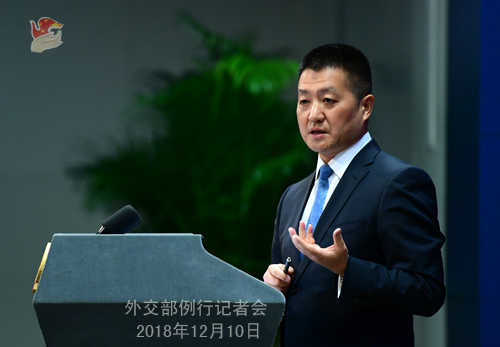Huawei's rotating chairman Ken Hu speaks to global media
chinadaily.com.cn | Updated: 2018-12-26 11:37

Eamon Barrett, Fortune: So one of the issues that various governments have raised concerning Huawei and the potential security threat is the national intelligence law which was passed last year which would compel any industry or company to cooperate with China's national intelligence work. Now, it's fine to say that Huawei has never been asked by our government to infiltrate or otherwise spy on a network but if the Chinese government would come to Huawei and ask it to, what legal grounds would Huawei have to refuse such a request?
Ken: First, on December 10th, the spokesperson of the Ministry of Foreign Affairs of China in a press conference formally clarified that no law in China requires companies to install mandatory backdoors.
Of course, just like the US and Australia, China also has certain legal requirements for counter terrorism or cyber security objectives. China also specially emphasizes that all government institutions or agencies must enforce the law according to the law. There are clear definitions.
For Huawei, our approach is to address these issues in strict accordance to the law. In the past, we haven't received any requests to provide improper information. In the future, we will also follow in strict accordance to the law in dealing with similar situations. When we talk about according to the law, the law has clear stipulations around the terms of reference for related agencies.
Gao Yuan, Bloomberg: We know Huawei has appointed an enacting CFO after the Sabrina's case. My question is – with the current case, if Sabrina can continue with her responsibilities as corporate CFO and what are the real implications and impacts of this case on Huawei's operations because we have learned from some of Huawei's international employees that if there is no financial guidance of this nature, it will have an impact on their business like procurement.
Ken: Currently, our business operations are not impacted by the case in Canada. Our business operations as a company and operations in the financial system are still business as usual.
Ryan Mcmorrow, AFP: After Meng was arrested in Canada, the Chinese government arrested two Canadians on national security concerns. The Chinese government has said this is not in retaliation, but most independent experts now say it was. Does Huawei have any comments or thoughts on the arrest of these two people?
Ken: No comment.
Eunice Yoon, CNBC: Do you think that Huawei will have any significant business in the United States and does it matter to the company for the future?
Ken: Well, US is one of the biggest communications markets in the world and I would definitely not say it doesn't matter to us. However, the reality today makes this very difficult for Huawei to enjoy business growth for reasons I think you all know.
As a result of that, our current status of US business, I would say, is very limited business. Of course we still have customers in the United States and we continue to follow our business principle of customer-centricity. We try everything we can to provide the best possible services to them and they are very satisfied with our services.
On the other hand, we also noticed that the United States is also in a development period when it comes to the digital infrastructure market.
Because Huawei cannot participate in the US market, we also notice that this is a market that is falling short of competition in a very big way.
According to some economists, from the period of 2017 to 2020, which we believe is a very important period for 5G deployment, if Huawei could participate in market competition, there would be 20 billion US dollars of savings when it comes to capital expenditure for wireless infrastructure.
At the same time, since Huawei cannot participate, HHI –which describes market concentration in certain geographies, in the US – HHI is as high as 2,500, much higher than other markets in the world, which are typically in the range of 1,000.
Since the best suppliers and the best technologies cannot be part of the market, I believe from a deployment cost point of view, this will significantly be higher. At the same time, it will substantially delay time-to-market of new technologies.
At the same time, the digital infrastructure industry dependencies highly dependent on the global supply chain. In other words, the equipment of any company in our industry relies on the global supply chain for development and manufacturing.
At the same time, when it comes to deployment, in most of the cases we can say that digital infrastructure is going to be a multi-vendor environment. It requires collaboration and partnerships with players across the industry.
From that point of view, banning a particular company from market competition cannot fundamentally address concerns about cyber security. From that point of view, we believe that, at the end of the day, US markets will need best technologies and best companies to participate in market competition. When that day will come, we don't know. We have patience.
























